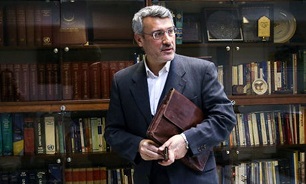Iran Raps UK Decision to Extend Diplomatic Protection to Spy
 In reaction to Hunt’s statement, Baeidinejad said the UK government’s extension of diplomatic protection to Iranian citizen Nazanin Zaghari, who is serving her term in Iran on espionage charges, contravenes international law.
In reaction to Hunt’s statement, Baeidinejad said the UK government’s extension of diplomatic protection to Iranian citizen Nazanin Zaghari, who is serving her term in Iran on espionage charges, contravenes international law.
“Govts may only exercise such protection for own nationals. As UK Govt is acutely aware, Iran does not recognize dual nationality. Irrespective of UK residency, Ms. Zaghari thus remains Iranian,” he said in a Friday tweet.
Hunt announced on Friday that London had decided to give Zaghari diplomatic protection “as part of the Government’s continuing efforts to secure her release.”
“Affording diplomatic protection in Nazanin’s case represents formal recognition by the British Government that her treatment fails to meet Iran’s obligations under International law and elevates it to a formal State to State issue,” a statement by the UK Foreign Office said.
“I have today decided that the UK will take a step that is extremely unusual and exercise diplomatic protection,” Hunt said in a video message.
In his message, Hunt repeated his earlier allegation that Iran had denied medical care to Zaghari, a claim that, according to Iranian Foreign Ministry spokesman Bahram Qassemi, “indicated his lack of knowledge on the case.”
Earlier in mid-January, Baeidinejad described Hunt’s call in regard with the case of Zaghari as “meddlesome”, and reminded that Britain’s interference in internal affairs of his country is strongly rejected.
Baeidinejad made the remarks in a post on his Twitter account, a day after he was summoned by Hunt, who demanded that Zaghari be given immediate access to the healthcare she needed during his talks with the Iranian envoy.
Hunt had also tweeted, “Her ongoing detention is TOTALLY unacceptable.”
Commenting on the content of his talks with Hunt, Baeidinejad said he had told the top British diplomat that “meddling with the situation of an Iranian citizen would amount to interference in Iran’s internal affairs, and is thus rejected, especially when Mrs. Zaghari is behind bars for spying for your own government.”
“The recommendations made to her by individuals outside prison also serve political purposes and do not help her,” he tweeted.
In an interview with IRNA, Baeidinejad also dismissed reports that Zaghari -- who has gone on hunger strike -- is being denied access to medical treatment.
“Mrs. Zaghari, as an Iranian national, has received necessary medical care in prison and she will continue to enjoy her right to access medical care while in jail,” he said.
Nazanin Zaghari-Ratcliffe, a 38-year-old project manager with the Thomson Reuters Foundation, was arrested in Tehran in April 2016 as she was returning to Britain.
While the British media have claimed that she was arrested after a family visit, British Foreign Secretary Boris Johnson told a parliamentary committee in November that Zaghari-Ratcliffe was "simply teaching people journalism as I understand it" when she was arrested at Tehran airport last year.
Also, Kamal Foroughi, is a 77-year-old Iranian-British national who have been held in an Iranian jail for more than four years and convicted of spying.
Foroughi, a businessman who was working in Tehran as a consultant for the Malaysian national oil and gas company Petronas, was arrested in May 2011 and eventually sentenced in 2013 to a total of eight years’ imprisonment, which he is still serving.
Iran's laws do not recognize dual citizenship.
Earlier reports said that Johson's visit to Iran in early December was aimed at consultations to free Zaghari by paying £400mln to Tehran. A claim which was rejected last month.
Baeedinejad said in November that Britain is due to pay its £400mln debt to Tehran soon, dismissing any link between the payment and the case of Nazanin Zaqhari.
Over £400-mln ($596mln) sum will be transferred to the Central Bank of Iran “in the coming days”, Baeedinejad wrote on his Telegram channel.
The Iranian diplomat further expressed regret over certain media attempts to link the debt pay-off to the case of Zaghari.
The payment “with regard to a 1974 arms deal has nothing to do with the case of Nazanin Zaghari who has been arrested in Iran over security charges or to any other issue,” Baeedinejad told reporters.
Also in December, Bahram Qassemi said that “the British government’s debt pay-off to Iran has no connection to the case of Mrs. Nazanin Zaghari and these two issues are two separate cases.”
British Prime Minister Theresa May's spokesman also stressed at the same time that there was no link between the £400mln debt owed to Iran and the fate of Zaghari.
Message end/
